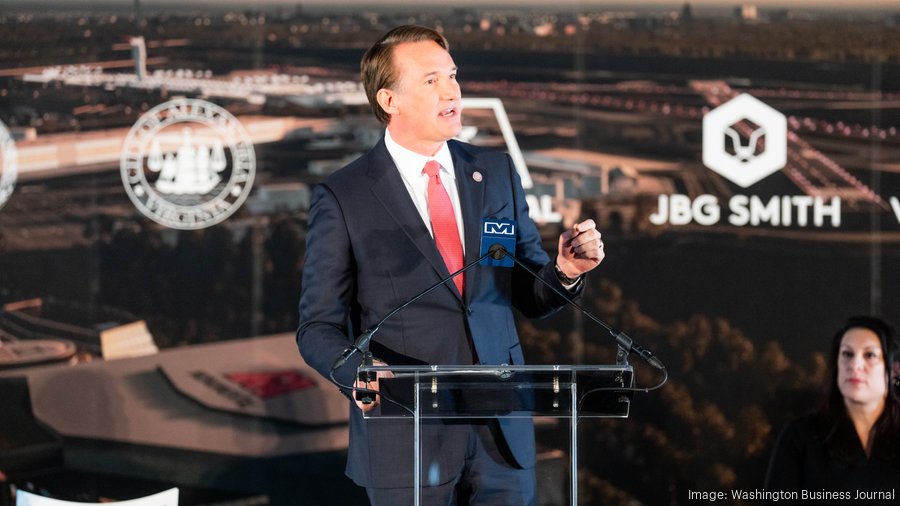Listen to this article 3 min
The Northern Virginia Transportation Commission has sounded an alarm to state legislators about a budget amendment from Gov. Glenn Youngkin that would slash extra funding for Metro — funds the transit authority has said it badly needs to help cover a budget shortfall and avoid service cuts, staving off potentially dire economic consequences for Greater Washington.
The Virginia General Assembly's budget, which it approved and sent to Youngkin for his consideration in March, provided additional state aid over the next two fiscal years to the Washington Metropolitan Area Transit Authority, which oversees Metro’s rail and bus services. It included $65 million in fiscal 2025 and $84.5 million in fiscal 2026, or $149.5 million in all, to help offset Metro's loss of dried-up Covid-era federal bailout dollars and depressed ridership revenues.
Amendments from the governor received in the House of Delegates April 8 eliminate that extra funding entirely in the first year and reduce it in the second year to less than $36 million — a roughly $113.5 million delta, representing a three-quarters overall reduction in the extra funding the General Assembly previously voted for.
The General Assembly will cast final votes Wednesday on the budget, including the governor's more than 230 amendments. The amendments will be taken up individually or in grouped blocs and require a simple majority to accept or reject. Youngkin could then veto that rejection, and it's unlikely pro-Metro legislators could muster the two-thirds vote to override his veto.
NVTC, the quasi-public agency that manages funding for the six cities and counties that foot Metro’s bill, would use the extra funds the General Assembly committed to, along with matching local funds, cover a projected $263 million increase in Virginia’s operating bill for WMATA over two years — $119 million in fiscal 2025 and $144 million in fiscal 2026. Without extra state funding, those local governments could be forced to exhaust monies available to them in NVTC’s trust fund in fiscal 2025, leaving them largely on their own to cover the bigger Metro bill the following year, according to an April 12 letter from NVTC to state legislators, signed by NVTC Chair and Arlington County Board member Matt de Ferranti.
Northern Virginia counties and cities “would need to look to taxpayers a second time, beyond the existing local investments already being made in Metro,” placing “an overly disproportionate burden on local budgets,” NVTC’s letter said. The local governments will almost certainly balk at that.
WMATA didn’t respond to requests for comment and the Metropolitan Washington Council of Governments, a nonprofit clearinghouse, declined to comment.
Youngkin “has and continues to support WMATA's 2025 budget that calls for an additional $119.4 million from the six northern Virginia jurisdictions,” according to a statement from his office. But what he “does not support is for the Commonwealth to not only pay its share, but to pay the jurisdictions’ share as well. The rest of Virginia should not have to pay twice for the same thing.”
It's hard to overstate Metro's importance to Greater Washington as a regional economic driver — the NVTC claims it generates some $1 billion in state tax revenues. Most of the mega-developments we report on are on or near Metro. Mass transit proximity was among the decisive factors in Amazon.com Inc. (NASDAQ: AMZN) deciding to locate its HQ2 here. The new FBI headquarters and its thousands of employees, whether or not Northern Virginia lawmakers are successful in wrestling it away from Greenbelt, will invariably go near Metro. Almost certainly, so too would the much anticipated Washington Commanders’ football stadium-and-entertainment-plex, wherever it lands.
Youngkin has never been jazzed about paying more for Metro. In recent months, however, he’d indicated he’d be willing to horse-trade to gain support for a publicly financed sports arena in Potomac Yard, a project he strongly supported but which the General Assembly recently torpedoed.
Even before Youngkin’s slashing of extra Metro dollars, Virginia’s commitment to help right Metro's post-Covid ship was stingier than Maryland's and the District's. Maryland Gov. Wes Moore has committed $150 million extra for the next two fiscal years, increasing to $250 million fiscal 2027 and thereafter. D.C. Mayor Muriel Bowser and Council Chair Phil Mendelson have offered an extra $200 million, though only for fiscal 2025. As far as we can tell, those commitments are still solid. But Virginia's lowballing could give detractors of extra Metro dollars in those jurisdictions ammunition to pull back on their funding, as well.
In a Feb. 1 letter, Bowser and Mendelson said they “believe the WMATA funding formula is seriously flawed, relying on outdated inputs, and it must be revised equitably" in subsequent budget years. Read: Virginia and Maryland need to pony up more.





